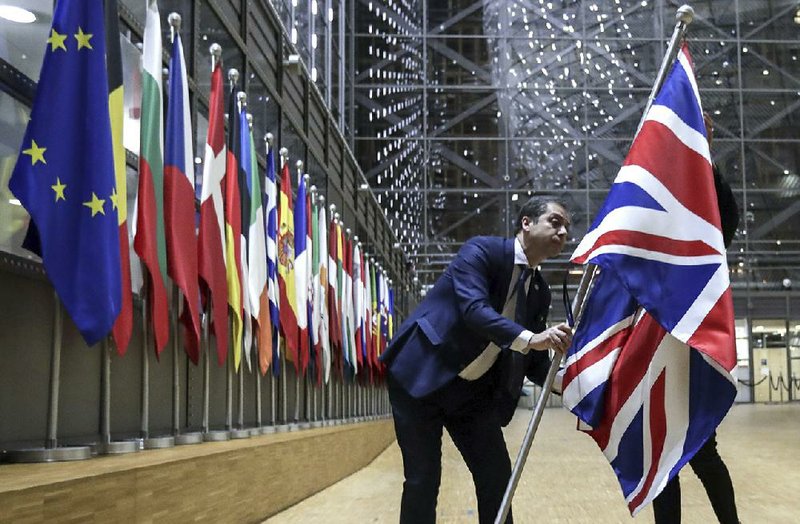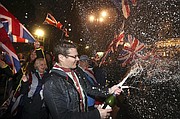LONDON -- Britain left the European Union on Friday night, dealing a historic blow to the bloc after nearly 47 years of membership.
However, the island nation remains bound by EU trade rules as it negotiates its future relations, a thorny process that could take through the end of the year, or longer.
The U.K.'s departure became official at 5 p.m. CST -- 11 p.m. in London, and midnight in Brussels, where the EU is based.
The British government greeted Brexit with little fanfare. Red, white and blue lights illuminated government buildings, and a countdown clock was projected onto Prime Minister Boris Johnson's residence at No. 10 Downing St.
[Video not showing up above? Click here to watch » https://www.youtube.com/watch?v=Esn_OHa_cDg]
British embassies were instructed to hold low-key affairs -- no special events -- and to avoid anything that smacked of "triumphalism."
That didn't stop several thousand Brexit supporters who gathered outside Britain's Parliament to sing "God Save the Queen" and welcome the moment they'd longed for since Britain's 52%-48% vote in June 2016: to walk away from the club it had joined in 1973.
The flag-waving crowd at Parliament Square broke into cheers as Big Ben bonged 11 times -- on a recording. Parliament's real bell has been silenced for repairs.
Nigel Farage, founder of Britain's Brexit Party, told the crowd that Friday's departure from the bloc was "the single most important moment in the modern history of our great nation."
"The war is over," added Farage, who often describes Britain's relationship with Europe in martial terms. "We have won."
Many Britons were simply relieved that the bitter and divisive debate over Brexit is over.
Londoner Donna Jones said she had gone to Parliament Square to "be part of history."
"It doesn't mean we're anti-Europe, it just means we want to be self-sufficient in a certain way," she said.
But others mourned the loss of their EU identity, and the freedom it offered to live anywhere in 28 countries.
"Many of us want to just mark our sadness in public," said Ann Jones, who joined dozens of others on a march to the EU's mission in London. "And we don't want trouble. We just want to say, well you know, we didn't want this."
In a message from nearby 10 Downing St., Johnson called Britain's departure "a moment of real national renewal and change," insisting that post-Brexit Britain would be "simultaneously a great European power and truly global in our range and ambitions."
"We want this to be the beginning of a new era of friendly cooperation between the EU and an energetic Britain," Johnson said in the address to the country broadcast an hour before Britain's exit.
In a break with usual practice, independent media outlets were not allowed to film Johnson's speech, which the government had recorded Thursday.
UNION JACK PUT AWAY
Some British commentators complained that the Europeans made a greater show of Britain's leaving, which they had opposed, than Britain did.
Brussels staged a light show in the Grand Place on Thursday, while members of the European Parliament serenaded their departing British colleagues with "Auld Lang Syne." In the many EU buildings of Brussels on Friday, British flags were quietly lowered, folded and taken away.
This is the first time a country has left the now 27-member EU, which will have to bounce back from one of its biggest setbacks in its 62-year history. Its former member has become a competitor, just across the English Channel.
French President Emmanuel Macron called Brexit a "historic alarm signal" that should force the EU to improve itself.
"It's a sad day, let's not hide it," he said in a televised address. "But it is a day that must also lead us to do things differently."
He insisted that European citizens need a united Europe "more than ever" to defend their interests in the face of China and the United States, to cope with climate change and migration and technological upheaval.
EU Commission President Ursula von der Leyen lamented Friday that "as the sun rises ... a new chapter for our union of 27 will start."
But she warned Brexit day would mark a major loss for the United Kingdom and said the island nation was heading for a lonelier existence.
"Strength does not lie in splendid isolation, but in our unique union," she said.
The future of the U.K. itself is also uncertain. While England and Wales backed Brexit, a majority in Scotland and Northern Ireland voted against it. On Friday evening, the headquarters of the Scottish government in Edinburgh was lit up in the colors of the European flag.
Candlelight vigils were held in several Scottish cities, and the bloc's flag continued to fly outside the Scottish Parliament.
Scottish First Minister Nicola Sturgeon said Brexit was "a moment of profound sadness."
"And here in Scotland, given that it is happening against the will of the vast majority of us, that sadness will be tinged with anger," she said in a speech in Edinburgh.
Sturgeon's Scottish National Party government is demanding the right to hold a referendum on independence from the U.K., something Johnson refuses to grant.
London, which is home to more than 1 million EU citizens, also voted by a wide margin to stay in the bloc.
Mayor Sadiq Khan said he was "heartbroken" about Brexit. But he insisted London would remain a city that welcomed all, regardless of "the color of your skin, the color of your flag, the color of your passport."
TRANSITION PERIOD
Britain's exit from the bloc marks only the end of the first stage of the Brexit saga.
When Britons wake up today, they will notice very little change. The U.K. and the EU have given themselves an 11-month "transition period" -- in which the U.K. will continue to follow the bloc's rules -- to strike new agreements on trade, security and a host of other areas.
Johnson won an election victory in December with a dual promise to "get Brexit done" and deliver improved jobs, infrastructure and services for Britain's most deprived areas, where support for leaving the EU is strongest.
On Friday, he symbolically held a Cabinet meeting in Sunderland in northeast England, rather than in London. The city, a traditional Labor Party stronghold, had voted 61% in favor of Brexit.
The prime minister celebrated Brexit as a triumph for self-government, and promised to undertake the "biggest revival of our infrastructure since the Victorians."
As Britain casts off from Europe, Johnson hopes to deepen his country's alliance with the United States, starting with a trade deal that the government wants to negotiate in tandem with its agreement with the European Union. President Donald Trump had avidly encouraged Brexit, and his emissary welcomed Britain's new status.
"America shares your optimism and excitement about the many opportunities the future will bring," Robert Wood Johnson IV, the U.S. ambassador to Britain, said in a statement.
For Boris Johnson, the question is which sectors of the economy to prioritize and what trade-offs to make in the post-Brexit era. His government argues that by freeing itself from European regulation, it could become a leader in new technologies like artificial intelligence. As Johnson's influential adviser, Dominic Cummings, once put it, Britain can become the best place for those who want to "invent the future."
Yet in leaving Europe's single market and customs union, Britain is sacrificing the smooth and frictionless flow of goods across its borders.
Tony Blair, a former prime minister and ardent opponent of Brexit, acknowledged that the British had always been ambivalent about European integration. For instance, Britain never adopted the euro as its currency. But, he said, "the tragedy is that it was actually quite a successful relationship."
Those who dream of Britain rejoining the bloc one day will have to wait for a while, he added.
"Who knows?" Blair said. "The thing I'm sure about is that there's no point in occupying a lot of time on that now."
Information for this article was contributed by Jill Lawless, Raf Casert, Jo Kearney and Philipp-Moritz Jenne of The Associated Press; and by Mark Landler, Stephen Castle and Benjamin Mueller of The New York Times.
A Section on 02/01/2020

